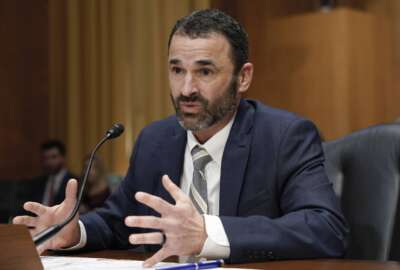Hubbard Radio Washington DC, LLC. All rights reserved. This website is not intended for users located within the European Economic Area.
On Air: Federal News Network
Trending:
Congress amps up Federal Acquisition Institute’s horsepower
As part of the Defense Authorization bill, lawmakers approve the FAI Improvement Act. The provision reaffirms the organization\'s role to oversee and train the ...
wfedstaff | June 4, 2015 3:22 pm
The Federal Acquisition Institute is getting some much needed horsepower to improve the civilian acquisition workforce.
In the 2012 Defense Authorization bill passed by Congress last week, lawmakers included the FAI Improvement Act to reaffirm the organization’s role in overseeing and providing training for non-Defense Department acquisition workers.
The bill also includes the Federal Internship Improvement Act, which complements the goals of the FAI provisions. 
This is one of the first major acquisition workforce bills to address civilian needs in a decade. For the last 10 years, Congress has had little success in passing bills to improve training or the numbers of acquisition workers. Lawmakers cut the acquisition workforce in the 1990s and it has been slow to recover.
Good first step
Sen. Susan Collins (R-Maine), the main sponsor in the upper chamber, said in an emailed statement, “the FAI Improvement Act is a good first step to address agency procurement challenges.”
She said the bill would raise the profile of and enable FAI “to achieve the promise it has failed to achieve since its inception in 1976 and would help produce a better trained civilian acquisition workforce.” 
While both houses of Congress approved the bill, President Barack Obama has not yet signed the Defense Authorization bill. If he doesn’t sign it before the House recesses, it would be a pocket veto.
Requests to the White House to comment on the possibility of a pocket veto have not been returned.
A Senate Armed Services Committee spokesman said there is no indication the President is not going to sign the bill.
A spokesman for the House Democrats on the Armed Services Committee also said they too are not concerned about a possible pocket veto. And a spokesman for the House Republicans on the Armed Services Committee also said they have no indication of a possible veto.
Breath of fresh air
The administration does support the FAI Improvement Act. Dan Gordon, the outgoing Office of Federal Procurement Policy administrator, testified in support of the FAI bill in November before the House Oversight and Government Reform Subcommittee on Technology, Information Policy, Intergovernmental Relations and Procurement Reform.
He said the FAI Improvement legislation was a breath of fresh air.
“There are provisions in the bill that are clearly helpful. There has been some nervousness quite frankly on the part of people in my office that the bill’s language would appear OFPP would actually be running FAI,” Gordon said during the November hearing. “I don’t think that is the intent. We need to be sure we are able to keep having the General Services Administration in its important role it has shown. But with that caveat, I do think the bill sends a very strong signal in improving and strengthening the Federal Acquisition Institute.” 
Alan Chvotkin, the senior vice president and counsel for the Professional Services Council, an industry organization was a big supporter of the bill. He says FAI has lost some of its luster over the last few years.
“There has been some doubt and over time there obviously been a misallocation of resources,” Chvotkin said. “FAI always had the smallest amount of money of all the training activities, even compared to some of the others such as the Veteran Affairs University, or everybody by comparison to the Defense Acquisition University. The bill also makes sure there is no ambiguity about the central role FAI plays under the direction and control of OFPP. I think this provision elevates this by putting into statute some very clear roles and responsibilities.”
Specifically, the bill:
- Creates an associate administrator in OFPP to oversee workforce programs;
- Requires the OFPP administrator to recommend to GSA a budget for FAI to support government-wide training and standards development
- Creates a formal FAI board of directors, where OFPP chooses eight people from the government in a mix of acquisition functional areas.
- Requires FAI to work with OFPP to develop and update government-wide training standards and certification requirements. This includes developing and modifying programs, ensuring quality assurance of agency implementation, developing career path information and coordinating with the Office of Personnel Management on acquisition workforce needs.
- Requires OFPP to create guidelines agencies should follow for internship and training programs through FAI.
A government source, who requested anonymity because they didn’t get permission to talk about this issue, but follows acquisition closely, said many of the improvements called for by the FAI bill already are being put in place.
The source said there is new leadership at GSA and OFPP, including a new associate administrator at OFPP, a new associate administrator at GSA, and a new director at FAI, and eventually a new OFPP administrator will help focus the changes.
Stan Livingstone, an acquisition practice manager with ASI Government, said the bill gives FAI the tools needed to improve training and oversight of the civilian acquisition workforce.
“Right now FAI doesn’t have the horsepower to actually start their own initiatives, follow through and deliver on them,” he said. “What I think this new law will do is give them the strengthen to do that. It will give them the capability to take a look overall at the workforce, define deficiencies, define areas that need to be improved and develop the training for that.”
He said buffed-up FAI would give acquisition workers the ability to lay out a career roadmap and plan their own development.
Connolly also sponsored the internship provisions, which supplements the FAI Improvement Act.
It calls for agencies to:
- Appoint intern coordinator
- Make internship and intern coordinator contact information available on Internet
- Update internship definitions to exclude those programs which were used as de-facto non-competitive hire programs, such as the Federal Career Internship Program (FCIP).
- The conference report directs OPM to consider the feasibility of creating a database and states that the committee “expects” OPM would conduct exit interviews.
“The internship provisions will help federal managers recruit the highly-skilled federal employees we need to replace the wave of baby boomers retiring from federal service over the next decade,” Connolly said.
RELATED STORIES:
Acquisition workforce showing signs of change
Acquisition workforce training going virtual
Exclusive: Gordon stresses future continuity as he prepares to leave
Copyright © 2024 Federal News Network. All rights reserved. This website is not intended for users located within the European Economic Area.
Jason Miller
Jason Miller is executive editor of Federal News Network and directs news coverage on the people, policy and programs of the federal government.
Follow @jmillerWFED
IRS seeks $104B for multi-year modernization fund to maintain customer service improvements
Related Topics





